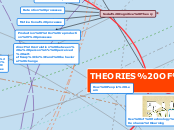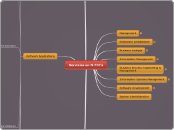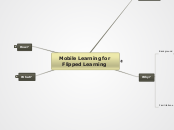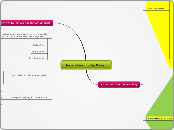Floating topic
Radical Behaviourism
Classical Conditioning
Operant Conditioning
Connectivism
Technological Teaching Tools
Flipgrid
Games
- Game reward systems can be modeled in non-game environments, including personal and business environments, to provide positive motivation for individuals to change their behavior
Examples: board games, puzzles
Gizmos
mBot
Behaviour
Experiential Learning Theory
- David Allen Kolb, founding father
- Cyclical process that capitalizes on the participants' experiences for acquisition of knowledge
- provides a holistic model of the learning process and a multi-linear model of adult development
Review
Observation
Reflection
Experimentation
Planning
Thinking
Setting goals
Environmental Interaction
Theory of Moral Development
- Founding father: Lawrence Kohlberg
Post-Conventional
Conventional
Pre-Conventional
Moral decision making & reasoning
Social Cognitive Theory
- Founding father: Albert Bandura
- learning occurs in a social context with a dynamic and reciprocal interaction of the person, environment, and behavior
- Behavior, Personal factors, and Environmental factors all influence each other
- Considered as a bridge between behaviorist and cognitive theories
direct correlation between a person's perceived self-efficacy
and behavioral change
Sociocultural Theory
- Founding father: Lev Semyonovich Vygotsky
- development depends on interaction with people and the tools that the culture provides to help form their own view of the world
- active social interaction
Bioecological Model of Human Development
- Urie Bronfenbrenner, founding father
- Attributes the driving force of development to so-called proximal processes: stimulating, regular face-to-face interactions over extended periods with people, objects, or symbols, which promote the realization of the genetic potential for effective biological, psychological, and social development
Biological Processes, Cognitive Processes, and Socioemotional Processes
Ecologies
Settings
Context
student’s
relationship with and development within this sociocultural world
principal proponent of culture: language
significance of culture
performance accomplishments, vicarious experience, verbal
persuasion, and physiological states
Production (or reproduction) processes
Motivational processes
Retention processes
Attentional processes
Information Processing Theory
- Concerned with how people view their environment, how they put that information memory, and how they retrieve that information later on
addresses how people respond to the information they receive through their senses and
how they further process those information with steps of attention, forgetting, and retention.
long-term memory
short-term memory
sensory
memory
Theory of Human Motivation
- Abraham Harold Maslow
- Hierarchy of needs
- integrated wholeness of the organism must be one of the foundation stones of motivation theory
hierarchy of needs
Bloom's Taxanomy
- Benjamin Samuel Bloom, founding father
- Promotes higher forms of thinking in education, such as analyzing and evaluating concepts, processes, procedures, and principles, rather than just remembering facts (rote learning).
Knowledge,
Comprehension, Application, Analysis, Synthesis, and Evaluation
Attitude
Skills
Kowledge
Theory of Multiple Intelligences
- Howard Gardner, founder
- utilizes aspects of cognitive and developmental psychology, anthropology, and sociology to explain the human intellect
- All human beings possess all nine intelligences in varying degrees
- Each individual has a different intelligence profile
- Education can be improved by assessment of students' intelligence profiles and designing activities accordingly
- Each intelligence occupies a different area of the brain
- The nine intelligences may operate in consort or independently from one another
- These nine intelligences may define the human species.
- There is no set method by which to incorporate the theory
Verbal/Linguistic, Logical/Mathematical, Visual/Spatial, Bodily/Kinesthetic, Musical, Interpersonal, Intrapersonal, Naturalisti, Existential Intelligence
Theory of Identity Development
- Erik H. Erikson, founder
- comprehensive psychoanalytic theory that identifies a series of eight stages, in which a healthy developing individual should pass through from infancy to late adulthood
Constructivism
- learning is a process of constructing meaning; make sense of their experience
- a synthesis of multiple theories diffused into one form
- assimilation of both behaviorialist and cognitive ideals
Formal learning environments
Social Interaction
Investigation
Learner-centric
Involvement
Commitment
Cognitivism
- Computational and structured
Cognitive Development Stages
- Adaptation of instruction
- Content of instruction needs to be consistent with the developmental level of the learner
- Sensorimotor Stage (birth to age 2) - gaining motor control and learning about physical objects
- Preoperational Stage (ages 2 to 7) - verbal skills
- Concrete Operational Stage (ages 7 to 11) - deals with abstract concepts such as numbers and relationships
- Formal Operational Stage, (adolescence to adulthood) - begins to reason logically and systematically
Cognitive development
Subtopic
Learning strategies
cognitive dissonance
critical thinking
divergent thinking
convergent thinking
Piaget
Equilibration
Accommodation
Assimilation
Lev Vygotsky
Zone of Proximal Development
Elaboration
Organization
Focuses on the inner mental activities – opening the “black box" of the human mind is valuable and necessary for understanding how people learn
Behaviorism
- Can be traced back to Aristotle,
- Founding fathers: John B. Watson, B. F. Skinner, and Ivan Pavlov
- observable & measurable aspects of human behaviour
- specific stimuli elicit response
- external factors over internal, e.g. mental
Human behaviour
Learning
Teaching
Knowledge
Aristotle’s thoughts
John B. Watson
B. F. Skinner
Ivan Pavlov
hypothesis behind behavioralist learning theories is that all learning occurs when behavior is influenced and changed by external factors
Genetic Factors; Environment(association /reinforcement)
Response to stimuli
Culture
Rewards
Motivation
THEORIES OF LEARNING
Use of technology to enhance learning
How People Learn
LEARNING DESIGN









